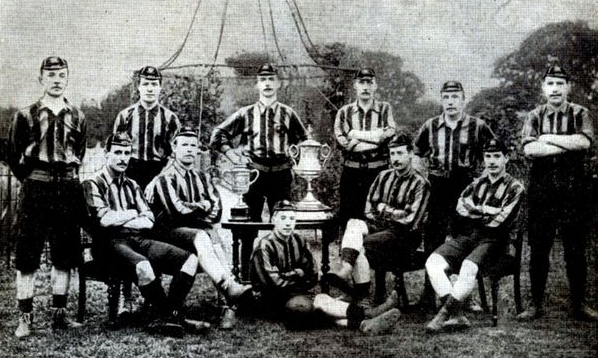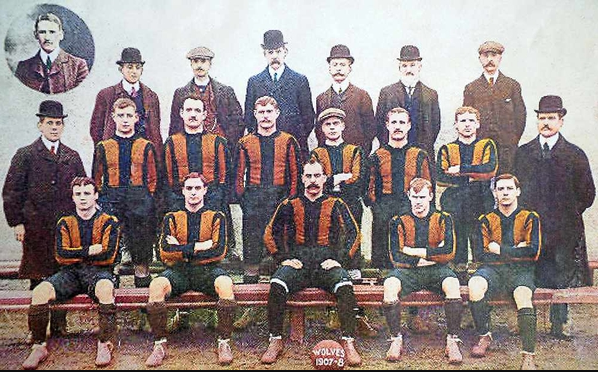Forest's assault on an incredible treble had continued unabated with their 2-1 home win in the F. A. Cup 4th Round against in-form Manchester City in midweek, as January flipped into February and the bleak English winter weather wore on.
Next in line to challenge Forest were Wolves. We had to pinch ourselves to remember that Wolves had been a team we wanted to emulate just a few months earlier as they won the Second Division championship, five points above us. Now, back in the top flight, Wolves struggled in 15th place, five points above the relegation zone, although their recent form had been pretty good, obtaining 7 points from their last 3 home and away games.
With so much cup success, Forest's fixture list was getting pretty congested and it was set to get much worse as February continued. It reminds me of a chess grand master, someone like Gary Kasparov, effortlessly taking on a room-full of good club players, moving from table to table, sitting down opposite his poor opponent, who had been wracking his or her brains for the last five minutes before finally deciding on the best move only for Kasparov to pick the perfect response within seconds. Certainly, for Forest, it was not so easy but they were taking on all-comers and obtaining a check-mate, or at least a stalemate, again and again.
Before going back to the rain-soaked City Ground, though, I am duty bound to give Wolves' great history a little more attention than I did for the first match at Molineaux, earlier in the season when Forest went 3-0 up with three headers only for Wolves to fight back with two late goals, almost to equalise.
After the first world war, Wolves had their worst period to date. They struggled in the second division and even got relegated to Division Three (North) before bouncing back the next season.
Seven years later they won the second division to return to the top flight after a 27 year absence but the inter-war years were quite barren for Wolves, as they had been for Forest, of course.
Wolves' glory years were after the second world war and were the best team in England for about a twenty year period, winning the title three times and Cup twice. The man most closely associated with this period was Stan Cullis.
Wolves were runners up to Liverpool in the first season and just two years later they beat Leicester City 3-1 in the Cup final of 1949 to pick up their 3rd trophy.
Wolves won the league two years running, making it three times in six years. The 1958-59 season was a big one for both Forest and Wolves of course. Wolves won their third league title and Forest won the Cup 2-1 against Luton Town at Wembley.
So, if you're any kind of football fan, your mouth must now be watering at the prospect of a Wolves v Forest Charity Shield clash the next season.
Indeed it did happen but at the time it wasn't the practice to play the match at Wembley. In fact that "tradition" only started in 1974 when Liverpool beat Leeds 6-5 on penalties after drawing 1-1. Instead, Wolves, as champions, held the match at home although the front cover of the match-day programme didn't give any indication of the actual match taking place.
This was the first time the Charity Shield was played before the first league match of the season. Before that it was scheduled some time early in the season, usually in October.
So, at the start of the 1960s Wolves were right up there with best in England in terms of first division trophy wins.
And here's some footage of their 4th F. A. Cup win when they beat Blackburn Rovers 3-0 at Wembley in 1960, signalling their last but one major trophy up to this game in 1978.
Impressive as Stan Cullis' record undoubtedly was, one should put it into context and compare his track record with other great managers.
When you look at it critically, then, Cullis' record pales into comparison with Revie, Shankly and Busby but it was more successful than Clough/Taylor's time at Derby.
Wolves last major trophy win was in 1973-74 when they beat Manchester City 2-1 in the League Cup final at Wembley.
Next in line to challenge Forest were Wolves. We had to pinch ourselves to remember that Wolves had been a team we wanted to emulate just a few months earlier as they won the Second Division championship, five points above us. Now, back in the top flight, Wolves struggled in 15th place, five points above the relegation zone, although their recent form had been pretty good, obtaining 7 points from their last 3 home and away games.
With so much cup success, Forest's fixture list was getting pretty congested and it was set to get much worse as February continued. It reminds me of a chess grand master, someone like Gary Kasparov, effortlessly taking on a room-full of good club players, moving from table to table, sitting down opposite his poor opponent, who had been wracking his or her brains for the last five minutes before finally deciding on the best move only for Kasparov to pick the perfect response within seconds. Certainly, for Forest, it was not so easy but they were taking on all-comers and obtaining a check-mate, or at least a stalemate, again and again.
Before going back to the rain-soaked City Ground, though, I am duty bound to give Wolves' great history a little more attention than I did for the first match at Molineaux, earlier in the season when Forest went 3-0 up with three headers only for Wolves to fight back with two late goals, almost to equalise.
Wolves History
As I covered before, Wolves have largely dominated Forest over their history. Although formed 12 years after us, they were one of the 12 original league members.
Their first trophy was their F. A. Cup win in 1893, five seasons before Forest's first win.
 |
| Wolves beat Everton 1-0 in the 1893 Cup Final |
Fifteen years later, Wolves beat Newcastle United 3-1 to win their second F. A. Cup trophy.
 |
| Wolves, Cup winners 1908 |
For the period up to the first world war, Forest and Wolves were pretty much neck-and-neck, although they had enjoyed two FA Cup wins to our one. Both clubs averaged around 15th place in the league.
After competing in the first 18 seasons in the top flight, Wolves were relegated for the first time in 1905-06. Ironically they went down with Forest that year.
 |
| Wolves run in the top flight ended after 18 seasons |
Seven years later they won the second division to return to the top flight after a 27 year absence but the inter-war years were quite barren for Wolves, as they had been for Forest, of course.
Wolves' glory years were after the second world war and were the best team in England for about a twenty year period, winning the title three times and Cup twice. The man most closely associated with this period was Stan Cullis.
 |
| Stan Cullis, Wolves manager 1948-1964 |
 | |
|
Wolves won the league two years running, making it three times in six years. The 1958-59 season was a big one for both Forest and Wolves of course. Wolves won their third league title and Forest won the Cup 2-1 against Luton Town at Wembley.
 |
| Forest win the Cup |
 |
| Wolves win the league & Forest win the Cup, both for the last time, in 1959 |
 |
| Wolves' Championship winning squad, 1959 |
Indeed it did happen but at the time it wasn't the practice to play the match at Wembley. In fact that "tradition" only started in 1974 when Liverpool beat Leeds 6-5 on penalties after drawing 1-1. Instead, Wolves, as champions, held the match at home although the front cover of the match-day programme didn't give any indication of the actual match taking place.
 |
| Charity Shield Programme (we are told) |
This was the first time the Charity Shield was played before the first league match of the season. Before that it was scheduled some time early in the season, usually in October.
So, at the start of the 1960s Wolves were right up there with best in England in terms of first division trophy wins.
And here's some footage of their 4th F. A. Cup win when they beat Blackburn Rovers 3-0 at Wembley in 1960, signalling their last but one major trophy up to this game in 1978.
Impressive as Stan Cullis' record undoubtedly was, one should put it into context and compare his track record with other great managers.
When you look at it critically, then, Cullis' record pales into comparison with Revie, Shankly and Busby but it was more successful than Clough/Taylor's time at Derby.
Wolves last major trophy win was in 1973-74 when they beat Manchester City 2-1 in the League Cup final at Wembley.
Teams
Forest were unchanged again, for the eighth consecutive league game.
Wolves introduced George Berry for his first game of the season (2nd overall since his transfer from his first club Ipswich) in place of Bob Hazell and John Richards returned after missing the 3-1 win against Everton.
Nottingham Forest
1 Peter Shilton, 2 Viv Anderson, 3 Colin Barrett, 4 John McGovern, 5 David Needham, 6 Kenny Burns, 7 Martin O'Neill, 8 Archie Gemmill, 9 Peter Withe, 10 Tony Woodcock, 11 John Robertson.
Goals: John McGovern 1, Tony Woodcock 1.
Wolverhampton Wanderers
1 Paul Bradshaw, 2 Geoff Palmer, 3 Derek Parkin, 4 Steve Daley, 5 George Berry, 6 John McAlle, 7 Kenny Hibbitt, 8 Willie Carr, 9 John Richards, 10 Norman Bell, 11 Maurice Daly.
Attendance: 28,803
The Game
This was still in the bleak mid-winter in England and the game was in jeopardy of being postponed for the second weekend running. The City Ground, placed right by the banks of the Trent is prone to flooding and apparently was covered with water when referee, Derrick Richardson arrived in the morning to inspect the pitch.
Thankfully, the game was judged playable but the muddy ground played a big part in the afternoon's proceedings. Forest dominated and won one of those comfortable 2-0 home wins that Liverpool always seemed to manage at Anfield in those days.
The two goals were scored either side of half time. Tony Woodcock poked the ball in the net in the middle of a muddy penalty box scramble to put the reds 1-0 up at half time. John McGovern struck a superb volley at the end of a John Robertson cross to make it 2-0.
Other Results
The weather hit the football programme quite badly. In those days, even the biggest clubs were vulnerable to the weather.
Just seven first division games were played. It went well for Forest as both Arsenal and Liverpool both lost and so fell eight and nine points behind us, respectively.
Forest were now second in the current form league.
Bob Latchford grabbed both goals in their win over Leicester and so went six goals clear in the leading scorers chart. Tony Woodcock's 9th goal took him closer to Peter Withe who had now gone 15 games Withe-out a goal.
Next up - to play Leeds United in the two-leg League Cup semi-final. Wembley beckoned!





























Comments
Post a Comment